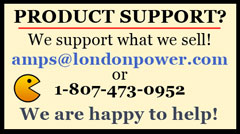What is a tariff?
A tariff is an import tax paid by the person or company importing the item.
Who levies the tariff?
The person’s own country levies the tariff through its Customs agency.
How much is the tariff?
According to Trump’s whims and moods, the extra cost to a US citizen importing goods from Canada is 35% of the value of the goods. When you view our site, the pricing is in Canadian dollars, which have a value of approximately 70-75 cents US. By a coincidence of the exchange rate and the imposed tariff having complimentary values, the cart total for the goods in CAD is approximately equal to the goods+tariff in US currency. There will still be shipping and a small tariff collection fee on top of this.
How is the tariff collected?
The person importing the goods will usually be contacted by the carrier who brought it across the border; this may be the import country’s postal system, a courier, or other shipping company. That service receives the monies from the importer and passes it to the Customs office, and is able to release the package to the importer.
Why are people upset with the US tariffs?
Where there have been tariffs between countries for decades, and many regions have had zero tariffs (free trade), the Trump government in the USA has added a twist to their imposed tariffs. The US requires other countries to collect the US tariff and submit it to US Customs prior to shipping the item across the US border. Effectively, every other postal system must do the work of the US Customs office, but there is still one more twist: every post office must sign up with a US company called Zonos, in order to process these transactions. Further, each postal system requires its customers shipping to the USA to also sign up with Zonos, so the shipper will do the work of paying the tariff and bring a proof-of-payment code to the post office, allowing the post office to proceed with the shipping process.
Who is Zonos?
Zonos is a company owned by Clint Reid and based in St.George, Utah, USA. They provide export fee collection and remittance to the receiving country’s Customs office, determine the tariff code for the goods being shipped, can integrate with a company’s shipping partner platforms and apps, and can integrate a company’s own invoicing system. Through all of this, the company relinquishes the privacy of its customer data. The few rates listed on Zonos’s site are astronomical. The expectation that every company does all their invoicing online is not unreasonable, but to expect such broad access is.
Is there an alternative to Zonos?
YES. Legacy courier companies such as Fedex, UPS, DHL, and others, have always performed customs brokerage, the act of determining the applicable tariff, collecting it from the receiver, and paying the receiving country’s Customs office. They do this for a small fee that is typically $10 to $20, paid by the receiver of the goods.
London Power’s solution for our valued US customers
London Power can accept orders from US customers via the phone during our business hours (11am-6pm EST M-F), or via email any time. We will ship Fedex Ground only, which has a reasonable cost. Your invoice will be mailed or emailed after the order ships, and this will contain the tracking info. Fedex is professional and reaches across the entire world. The package does not leave their system until they hand it to you. Fedex will notify you regarding the fees required to release your package. This is how tariffs are handled in other countries. It is simple and fair.
How much does this solution cost?
From the US orders we have processed so far using Fedex, there is a “buy-in” of about CAD40-45 to use Fedex Ground for the lightest order, PCBs, or SV2+VCK. Ship cost for a pair of TUT books is around CAD55.




